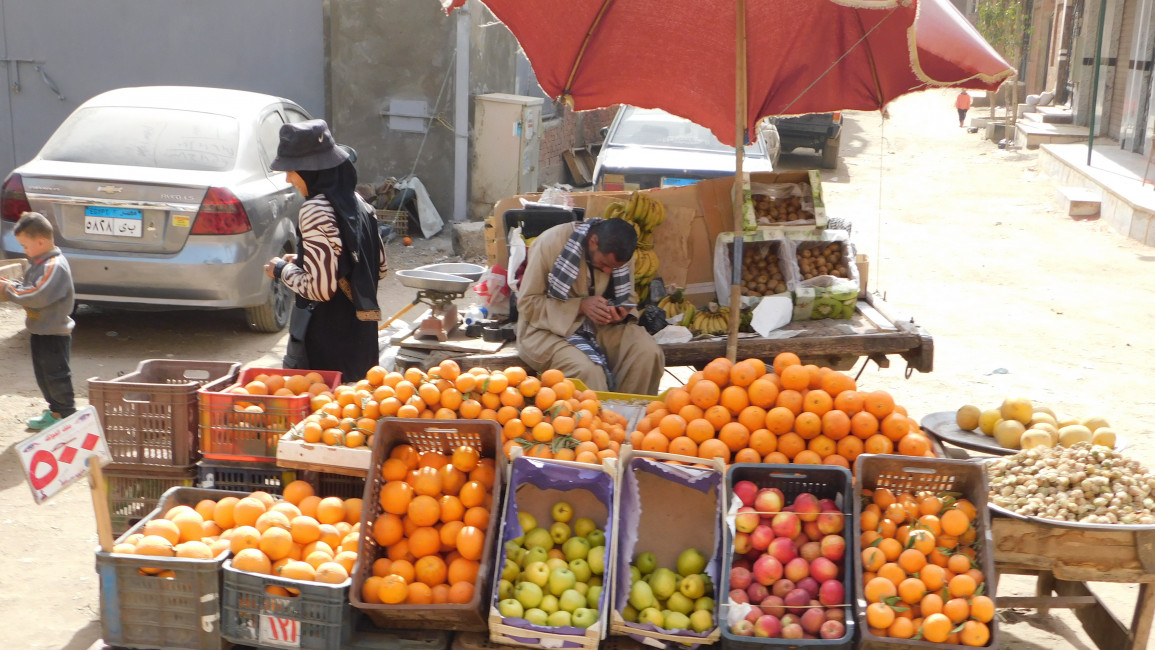Low-income Egyptian households face an 'unbearable' Ramadan as food costs rise
While the Egyptian government recently imposed controversial economic policies, prices of basic commodities witnessed unprecedented hikes as the holy Muslim month of Ramadan kicked off, sparking a state of unease among low-income households in the country.
On March 21, the Egyptian pound had plunged around 17% in its value against the US dollar, following a rise in inflation and a rise in prices across different aspects of life, especially food.
The pound has been trading at 18.32 Egyptian pounds to the dollar at banks on Monday after it had been valued at 15.77 before the recent flotation of the Egyptian pound.
Of Egypt's population of around 102,000,000 residents, one-third are estimated to be under the poverty line.
The New Arab visited the Kafr El-Gabal area of the Haram neighbourhood, which houses mostly poor and lower-middle-class families in the Giza province of the Egyptian capital, to gauge how they are handling the new price hikes.
The interviewees are anonymous, as per their request due to sensitivities in discussing the topic openly.
At the Batran local market in Kafr El-Gabal, more than one type of tomato is sold at different prices. A solid tomato is sold for the highest price and is usually used for salads, while a softer version is used for cooking. Almost rotten tomatoes are offered for the lowest price, and that is what many of the customers can buy.
"The price of tomatoes, an irreplaceable ingredient in almost all Egyptian dishes, has recently soared to the extent that people have become unable to afford it," one buyer, a public school teacher, told The New Arab, as she was picking one and a half kilos of the soft type, worth 15 Egyptian pounds, for a simple meal.
"The amount I'm buying is hardly enough for a one-day for my five-member family, plus 35 pounds more for other ingredients to make a dish such as 'moussaka,' without minced meat, let alone the rising cost of bread. So, we end up being vegetarians against our own will," she said, bitterly.
"My children have not eaten chicken or meat for several weeks now," she added.
Egypt imports a considerable amount of corn used for animal and poultry feed from Ukraine, which is facing an invasion by Russia since 24 February.
As a result, and due to massive disruptions in trade, the Egyptian government has been seeking alternatives as the prices of poultry and meat widely fluctuate daily. The changes in prices are so erratic to the extent that many customers check the prices of these products the way investors check the stock market.
Meanwhile, at most local markets in Kafr El-Gabal, the supply has surpassed the demand.
"I sell oranges at 6.50 pounds/kilo for a profit margin of one pound per kilo. But people started refraining from buying fruits, and are turning to the basics. That is why in many cases I end up selling the fruits after they become riper at a lower cost, and I deal with grave losses," a vendor told The New Arab.
French fries, for example, are no longer deemed a fun meal for children nor as a side dish. For many of the poorer communities in Egypt, it has become the main course served with bread.
"I tell my children they have to eat bread with fried potatoes to feel full or else we will not be able to survive, even though it still costs us expensive cooking oil. But what else can we eat?" a woman, who works at a nursery noted to The New Arab.
"We will continue eating the same food during Ramadan as we used to eat before, even though we need more nutrition to support our bodies after the long hours of fasting," she added with a sigh.
Among Egyptians' habits during Ramadan is drinking beverages that help people avoid dehydration, and most of these beverages are imported such as hibiscus and tamarinds juices.
Yet, after the rising price of the US dollar, these drinks have become a luxury rather than a custom.
"We cannot afford any of the options that can give us energy or help us hydrate at iftar time. We usually turn to tasteless juices made of powder, with some sugar in them, but even the price of sugar is high," a simple civil servant said to The New Arab.
"This has been our reality for almost six years now and has gotten unbearable over the past month."





